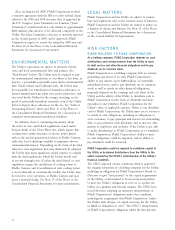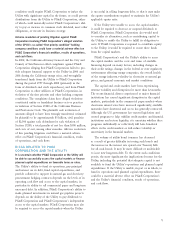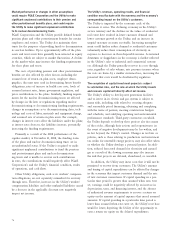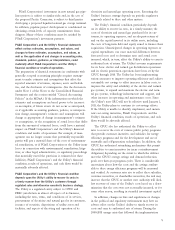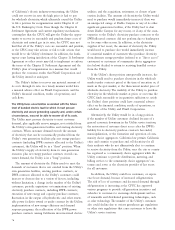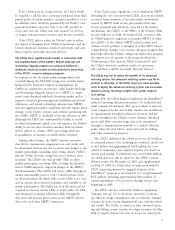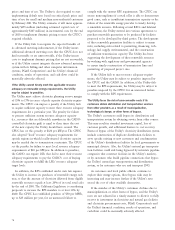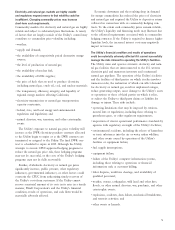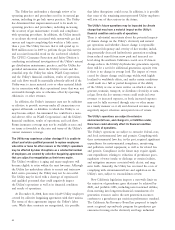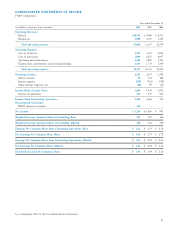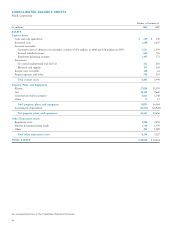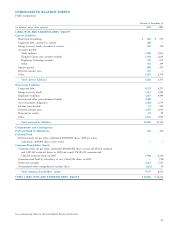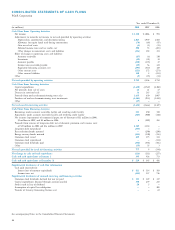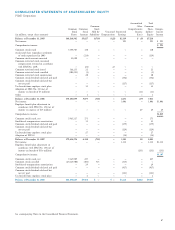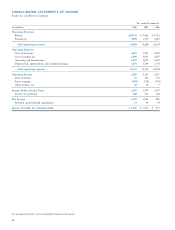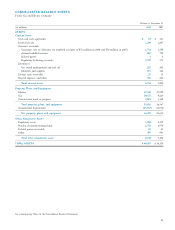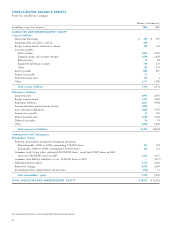PG&E 2008 Annual Report Download - page 84
Download and view the complete annual report
Please find page 84 of the 2008 PG&E annual report below. You can navigate through the pages in the report by either clicking on the pages listed below, or by using the keyword search tool below to find specific information within the annual report.82
to the aspects of its electricity and natural gas utility
operations that fall within the jurisdictional authority of
such agencies. These include customer billing, customer
service, affi liate transactions, vegetation management, and
safety and inspection practices. The Utility is subject to fi nes
and penalties for failure to comply with applicable statutes,
regulations, rules, tariffs, and orders.
For example, under the Energy Policy Act of 2005,
the FERC can impose penalties (up to $1 million per
day per violation) for failure to comply with mandatory
electric reliability standards. In the fourth quarter of 2009,
the Utility will undergo its fi rst regularly-scheduled triennial
audit for compliance with these standards.
In addition, there is risk that these statutes, regulations,
rules, tariffs, and orders may become more stringent and
diffi cult to comply with in the future, or that their inter-
pretation and application may change over time and that
the Utility will be determined to have not complied with
such new interpretations. If this occurs, the Utility could be
exposed to increased costs to comply with the more stringent
requirements or new interpretations and to potential liability
for customer refunds, penalties, or other amounts. If it is
determined that the Utility did not comply with applicable
statutes, regulations, rules, tariffs, or orders, and the Utility
is ordered to pay a material amount in customer refunds,
penalties, or other amounts, PG&E Corporation’s and the
Utility’s fi nancial condition, results of operations, and cash
fl ows would be materially adversely affected.
The Utility also must comply with the terms of
various permits, authorizations, and licenses. These permits,
authori zations, and licenses may be revoked or modifi ed by
the agencies that granted them if facts develop that differ
signifi cantly from the facts assumed when they were issued.
In addition, discharge permits and other approvals and
licenses often have a term that is less than the expected life
of the associated facility. Licenses and permits may require
periodic renewal, which may result in additional require-
ments being imposed by the granting agency. In connection
with a license renewal, the FERC may impose new license
conditions that could, among other things, require increased
expenditures or result in reduced electricity output and/or
capacity at the facility.
If the Utility cannot obtain, renew, or comply with
necessary governmental permits, authorizations, or licenses,
or if the Utility cannot recover any increased costs of com-
plying with additional license requirements or any other
associated costs in its rates in a timely manner, PG&E
Corporation’s and the Utility’s fi nancial condition and
results of operations could be materially adversely affected.
Utility has been storing spent nuclear fuel and high-level
radioactive waste resulting from its nuclear operations at
Diablo Canyon in on-site storage pools. The Utility also
obtained a permit to construct an on-site dry cask storage
facility to store spent fuel through at least 2024. An appeal
related to the NRC’s permit is pending. (See the discussion
above under “Regulatory Matters” and Note 13 of the Notes
to the Consolidated Financial Statements.) The construction
of the dry cask storage facility is complete and the initial
movement of spent nuclear fuel to dry cask storage will
begin in June 2009. If the Utility is unable to begin load-
ing spent fuel by October 2010 for Unit 1 or May 2011 for
Unit 2 and the Utility is otherwise unable to increase its
on-site storage capacity, the Utility would have to curtail
or halt operations of the unit until such time as additional
safe storage for spent fuel is made available.
Furthermore, certain aspects of the Utility’s nuclear
operations are subject to other federal, state, and local
regulatory requirements that are overseen by other federal,
state, or local agencies. For example, as discussed above
under “Environmental Matters,” there is substantial
uncertainty concerning the fi nal form of federal and state
regulations to implement Section 316(b) of the Clean Water
Act. Depending on the nature of the fi nal regulations that
may ultimately be adopted by the EPA, the Water Board,
or the California Legislature, the Utility may incur signifi -
cant capital expense to comply with the fi nal regulations,
which the Utility would seek to recover through rates.
If either the federal or state fi nal regulations require the
installation of cooling towers at Diablo Canyon, and if
installation of such cooling towers is not technically or
economically feasible, the Utility may be forced to cease
operations at Diablo Canyon.
If the CPUC prohibits the Utility from recovering a
material amount of its capital expenditures, nuclear fuel
costs, operating and maintenance costs, or additional pro-
curement costs due to a determination that the costs were
not reasonably or prudently incurred, PG&E Corporation’s
and the Utility’s fi nancial condition, results of operations,
and cash fl ows would be materially adversely affected.
The Utility is subject to penalties for failure to comply with
federal, state, or local statutes and regulations. Changes in
the political and regulatory environment could cause federal
and state statutes, regulations, rules, and orders to become
more stringent and diffi cult to comply with, and required
permits, authorizations, and licenses may be more diffi cult
to obtain, increasing the Utility’s expenses or making it more
diffi cult for the Utility to execute its business strategy.
The Utility must comply in good faith with all applicable
statutes, regulations, rules, tariffs, and orders of the CPUC,
the FERC, the NRC, and other regulatory agencies relating


